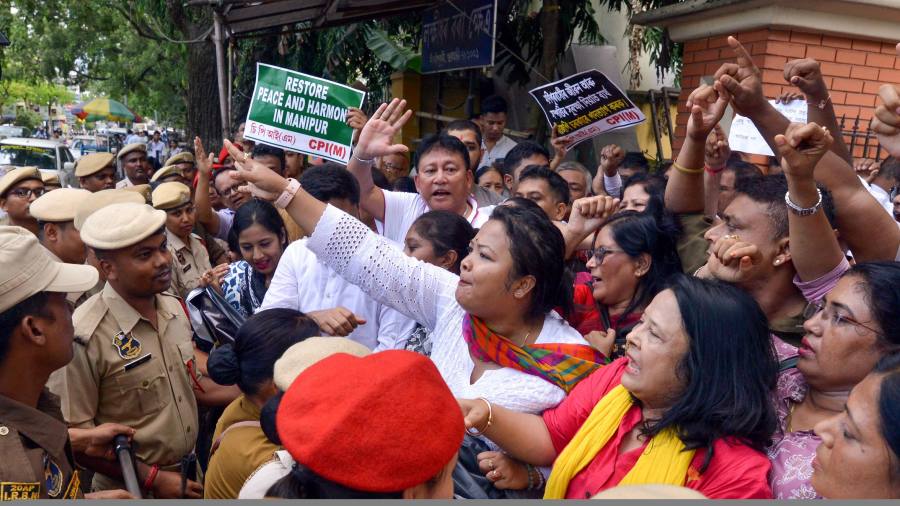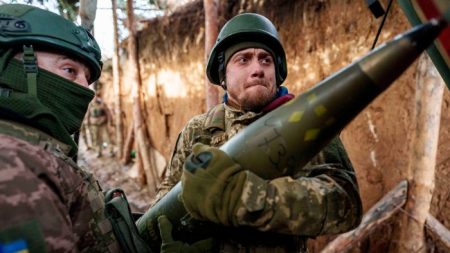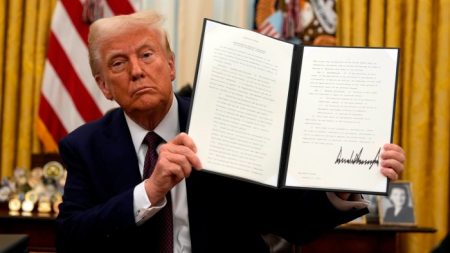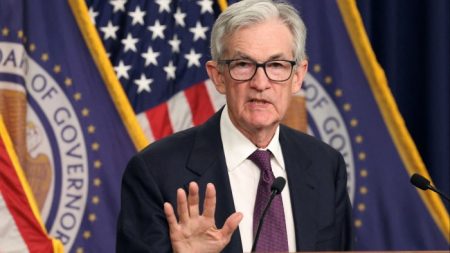Receive free Indian politics & policy updates
We’ll send you a myFT Daily Digest email rounding up the latest Indian politics & policy news every morning.
Narendra Modi’s political opponents are seizing on a grisly, three-month conflict in India’s north-eastern state of Manipur to challenge the prime minister on a security crisis of national significance they say his government has failed to contain.
Opposition parties, who are sharpening their lines of attack ahead of next year’s general election, say the violence is a threat to national security — a view shared by some analysts who warn it threatens to spill over to neighbouring states in a volatile region.
Members of the newly formed India National Developmental Inclusive Alliance, an opposition umbrella group, accused Modi at the weekend of “brazen indifference” to the violence, which has killed more than 180 people and displaced more than 60,000 since May.
Opposition parties have succeeded in placing a no-confidence motion against Modi’s government on parliament’s agenda, putting the prime minister on the spot in a legislature where his Bharatiya Janata party enjoys a solid majority and typically calls the shots. A vote is expected next week, before the end of the parliament’s session on August 11.
Though the motion is certain to fail, it will compel the prime minister to address the crisis in BJP-governed Manipur. Modi’s only remarks on it came last month when he expressed “pain” and “anger” over a widely shared video showing two women from the state’s Kuki minority being paraded naked by a mob.
“The opposition has made Manipur a prestige issue, a stick to beat Modi with,” said Neerja Chowdhury, a writer and contributing editor at The Indian Express newspaper. However, she added, “this has to go beyond the immediate politics that both sides want to play”.
Manipur is one of the north-eastern states known as the “Seven Sisters”, a region plagued by conflicts since India’s independence in 1947. It borders China and Myanmar’s Chin state, where residents have been in open revolt since a military coup in 2021.
Unlike past conflicts in the north-east, in which armed insurgents fought against the state, the current strife in Manipur has pitted two ethnic groups against each other, with incidents of gruesome violence including two women and a child being burnt in an ambulance and a man’s head being impaled on a stake.
Conflict broke out in May between the mostly Hindu Meiteis, the state’s dominant ethnic group who live in lowlands around the state capital Imphal, and the hill-dwelling, mostly Christian Kukis. Tensions between the groups escalated after the state’s BJP-led government floated a plan to extend tribal status to the Meiteis, which would give them the same affirmative privileges enjoyed by the Kukis, including the right to buy land in the hills.
Analysts said the conflict could spread beyond Manipur, which has a population of about 3mn. The Kukis are ethnically related to the Mizos in the Indian state of Mizoram to the south and to the Chin people in Myanmar. Some members of the group also live in Bangladesh, meaning ties of kinship and sympathy with the Kukis extend across India’s state and international borders.
The Kukis, as with other tribal groups, are permitted to travel freely to and from Myanmar under a border regime that some Indian officials have said allows arms and drugs to enter the country.
Some Meiteis have left Mizoram in recent weeks, voicing fears for their safety.
The Nagas, Manipur’s second-largest ethnic group, have mostly stayed neutral in the conflict but have voiced concern about being dragged into it because they live alongside the warring communities and in some cases have faced harassment or other repercussions.
“There are all the signs that it might spread” to other parts of the north-east, said Praveen Donthi, senior analyst for India with the International Crisis Group. “The genie is out of the bottle and they are trying to put it back.”
Communal tensions have escalated elsewhere in India amid what opponents say is Modi’s weakening of democratic institutions and promotion of Hindu majority interests. At least six people died this week in clashes between Hindus and Muslims in Haryana state near New Delhi.
Authorities in Manipur initially imposed an internet blackout. However, the partial lifting of the ban allowed images of burnt churches and violent attacks, including the sexual assault of two women, to be circulated adding pressure on Modi to act.
The government has deployed about 50,000 soldiers, armed police and other security personnel to the state to enforce buffer zones between the warring communities.
Mobs have looted more than 4,000 weapons and half a million rounds of ammunition from police in Manipur, according to official estimates, only some of which have been recovered. “There is no possibility that violence can calm down until these weapons come back,” said Sushant Singh, senior fellow at the Centre for Policy Research in New Delhi.
The BJP enjoys support from the Meiteis and Kukis, but some are demanding the central government dismiss Biren Singh, the state’s chief minister, and impose direct rule from New Delhi. The Kukis have also called for a separate administration on their lands.
“If the state government is not up to the job, they should have thought of a replacement,” said Pradip Phanjoubam, an editor based in Imphal.
Singh of the Centre for Policy Research said the conflict was a distraction for India’s military in a region that faces border tensions with China. In December, troops clashed in the disputed border around Arunachal Pradesh where China has built up infrastructure in recent years.
“This has strategic implications,” Singh said. “It weakens our defensive posture against China.”
Read the full article here















